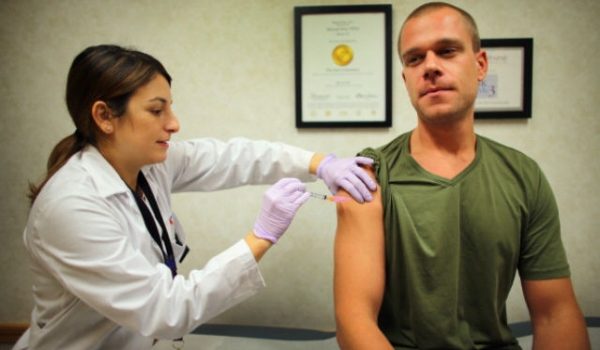Commonly called the flu jab, injectable flu vaccination is available annually to protect adults and children from catching the flu and its complications. Flu is irksome for it prevents you from doing your regular activities; however, if you are healthy, it will usually clear up on its own within a week.
But a bout of the flu is more severe for certain people: (1) elderly aged 65 and over; (2) pregnant women; (3) children and adults suffering from an underlying health condition as heart ailment or respiratory disease; and (4) children and adults whose immune systems are weak. Furthermore, anyone in these high risk groups will likely develop serious flu complications leading to pneumonia or a lung infection. The only protection is a yearly flu vaccination.
Flu vaccine is the best protection we have against an unpredictable virus that can cause unpleasant illness in children and severe illness and death among at-risk groups, including older people, pregnant women and those with an underlying medical health condition.
The work of the flu jab
After the flu vaccine is injected, the immune system of the body is stimulated to produce antibodies to fight the flu virus. The antibodies are proteins that recognize the presence of germs, such as viruses, that have invaded your blood so they fought off these invaders. After the flu vaccine and you get exposed to flu virus, your immune system immediately produces antibodies to fight it. But after a jab shot, you need 10 to 14 days for your immunity to build up fully.
Flu jab every year
A flu jab is needed every year, as the strength of antibodies protecting you from flu decline over time, and new flu strains can appear from year to year. Studies showed that a flu vaccine prevents you getting the flu but not all flu viruses for the level of protection varies between people. Consequently, it is not a 100% guarantee that you’ll be immune from flu; however, but after a vaccination it’s likely that when you catch the flu it will be milder and shorter-lived than it would otherwise have been.
Each year, the viruses that are most likely to cause flu are identified in advance and vaccines are made to match them as closely as possible.
Side effects of flu jab
Injected flu vaccines very rare have serious side effects; except sometimes, there is a slight temperature increase and muscles might ache for a couple of days. After having the jab, your arm may be a bit sore where you were injected.
The best time to have a flu vaccine is during the autumn staring from the beginning of October to early November, but you can have the vaccine later in winter if there are stocks left. You should avoid a flu jab if you are allergic to eggs.
Follow a healthy lifestyle
Many people believed that you will not have to worry about getting the flu if you maintain a healthy life style. The key steps that I follow to stay flu-free, include:
- Getting plenty of sunshine, keeping safe tanning bed exposure, or taking an oral supplement for optimal vitamin D3;
- Eating right for your nutritional type and avoiding sugar;
- Ample exercise and keeping physically active;
- Getting enough sleep;
- Learning to face emotional stress; and
- Washing your hands regularly.
By maintaining good habits, you stay healthy and drive doctors away.
If you want to get a flu shot or nasal spray, Target Corporation has announced the availability of their flu vaccines at all Target Pharmacy and Target Clinic locations nationwide. Target offers Quadrivalent, Trivalent and High Dose. All vaccines are also available in preservative-free options.


